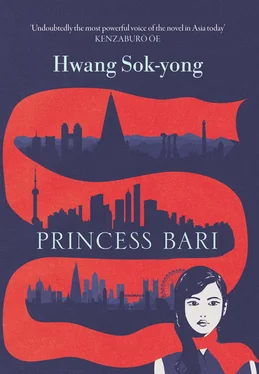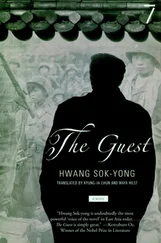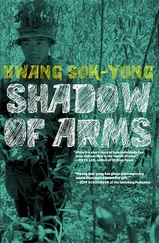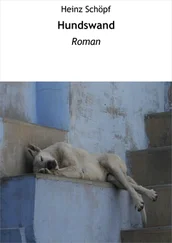“Xiang, come eat.”
I tried to wake her, but she frowned and struggled to raise her head.
“I don’t eat breakfast,” she said, and rolled over and went back to sleep.
I ate breakfast alone and then asked Luna to tell our boss that I couldn’t go to work that day. I told her I wasn’t feeling well.
When the minutes clicked by and I didn’t show up upstairs, Grandfather Abdul came down.
“I decided to stay home today,” I told him. I debated whether to tell him about my dream, but decided to hold off.
“Okay,” he said. “Looks like you have a visitor?”
“Yes, an old friend from back home.”
“Then I guess I’d better use this opportunity to go out for a change.”
He would probably drop by the mosque or to one of the neighbourhood parks to have a leisurely chat with his friends. I played with Hurriyah and then heated up some food for Xiang, who didn’t wake up until noon. Ayesha showed up in the afternoon, but when she saw I was there she headed back home. For the first time that day, I discovered how dirty the house was: all the blankets and rugs were soiled with spilled food and the baby’s spit-up. I pulled the sheets off of the mattress, undid the duvet covers and packed up the bedding with Hurriyah’s dirty clothes and my own. I looked down at her as she scampered from this toy to that, first chasing after a rabbit that hopped at the push of a button, then playing with a doll that could speak.
“Xiang, would you mind if I ran over to the launderette across the street?”
Xiang sipped her tea and smiled. “Of course! I’ll take care of things here.”
“If the baby cries, check her diaper and change it if it’s wet. Otherwise just hold her for a bit and she’ll stop.”
Xiang patted the giant sack of laundry on my shoulder and told me not to worry.
As it was a weekday afternoon, the launderette was mostly empty. There was just one other woman, a grandmother, who had also come to wash rugs and bedding, like me. She sat in front of the machine and stared vacantly at the fabric spinning around. After I’d put the laundry into the machines, inserted some coins and started them up, I went to a Sainsbury’s a few blocks down to get groceries. By the time I’d bought some things for dinner and returned to the launderette, the clothes were nearly done. It took another hour or so to dry everything, and then I left.
When I stepped into the alley that led to our building, a strange, sinking feeling came over me. The alley was empty, and all the houses on either side looked deserted. With the laundry sack on one shoulder and the grocery bag in my other hand, I started to walk faster. When I set down the bag and inserted the key into the lock, my hand was shaking. The moment I opened the door, I shouted and clapped my hand over my mouth. Hurriyah Suni lay at the bottom of the stairs like a crumpled-up rag doll. I rushed to pick her up.
“Suni- ya ! Suni- ya !”
Her head fell backward. I screamed and screamed, but the building must have been empty because no one came.
Even after taking her to the hospital and confirming that she was already dead, I couldn’t believe it. Grandfather Abdul showed up and tried to lead me away by the arm, but I sat there and refused to move. I couldn’t even cry.
“Little Mother,” Grandfather Abdul said, shaking me by the shoulder, “don’t you know? Hurriyah’s spirit isn’t here. She’ll be waiting for you at home.”
Only then did I lean my head into his chest and cry.
When I got home, the flat was a mess. Xiang had ransacked it the moment I left. The bottom drawer of my wardrobe was sticking out — she’d found our emergency stash. After Xiang rushed out, leaving the front door open behind her, Hurriyah must have cried and cried and then tried to make her way to Grandfather Abdul’s flat, where she played everyday, by crawling up to the second floor.
I had thought at first that I’d finally found Ali in my dreams, but later I realized the opposite was true. Ali had found me in order to warn me of something. Now I understood the look of pain on his face.
After coming home from burying my daughter, I didn’t leave the flat for two weeks.
I’d wanted to have her cremated, but Grandfather Abdul objected cautiously, saying that as Hurriyah was a daughter of Islam, her body shouldn’t be destroyed. She was buried in a Muslim cemetery tended by the mosque.
I locked myself in my room and did not go to work. Hurriyah Suni’s tiny clothes and toys covered my dresser and shelves. I picked up a rubber baby doll and pressed its belly button. I love you, Mummy. I love you, Mummy … The doll muttered the words over and over, then cut off. I hugged it to my chest and collapsed on the floor in tears. After a while, I gathered up all her clothes, sweeping them into the canvas sack I’d used for laundry. I took the sack into the yard, held a match to a bundle of newspaper, and set fire to it. When the flames caught and the clothes started to change colour and shrink as they turned to ash, I bent over and collapsed on the ground again. I covered my mouth, but the words burst out of their own accord.
“Xiang, you hateful woman! I’ll kill you!”
Later I understood that all Xiang had really done was remind me of something I’d kept locked inside of me all that time: the bitterness I felt toward every hardship I’d suffered over the course of my long journey.
For the first few days, Luna came by and tried to cheer me up with funny stories, but I had nothing to say in response. I refused all food but water, and would lie in bed all day or sit in a chair by the window and stare out into space. Grandfather Abdul came downstairs now and then with plates of food, but I lay on my side staring at the wall and wouldn’t move. He must have been frustrated with me, because one day he took a look at the plate he’d set out the day before, now crusted with untouched food, and confronted me.
“Everyone dies,” he said. “It doesn’t matter whether we die of an accident or illness or by our own hand. Death is not the end. This is a new beginning for Hurriyah. You have to wait until your time comes too, and you can see her again.”
I finally responded: “Why does God keep making me suffer? I never did anything wrong. What difference does believing and having faith make?”
“God watches over us, but doesn’t interfere in our lives. He has no colour, no shape, never laughs or cries, neither sleeps nor forgets, has no beginning and no end, but is always there. Pain and suffering are the results of things we’ve already done wrong. The purpose of life’s good and bad is to teach us to be better people, which is why you have to overcome this and appreciate the beauty of life. That’s what God wants from us. So hurry up and eat something and get your strength back!”
“Just leave me be!”
Grandfather Abdul picked up the plate and turned to leave. At the bedroom door, he paused and added: “When my wife and daughters were shot and I fled Jammu and Kashmir, I was angry at God, too. I didn’t understand how He could make good people suffer. But the truth is that all of us who are flesh are already in Hell, on Earth. Anger is a Hell of your own making. God waits silently for us to free ourselves and get closer to Him.”
He closed the door quietly and left. I was so exhausted that I just lay on the bed and wept.
The ceiling opens, and I float up into the dark. As always, a white path appears. I glide over the path to where Chilsung is waiting for me, his tail wagging. I drop toward him, as if I’m collapsing, and try to put my arms around him. But he backs away just a tiny bit and keeps wagging his tail, always keeping the same distance between us.
Читать дальше












